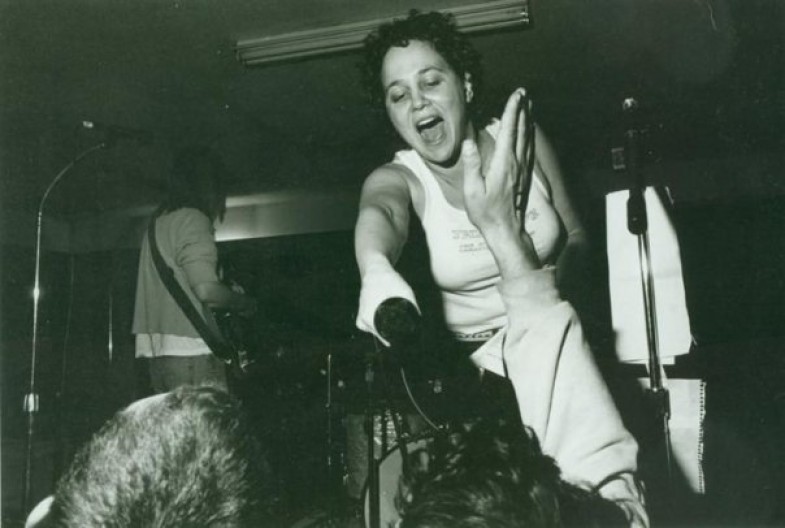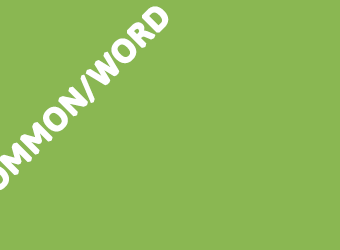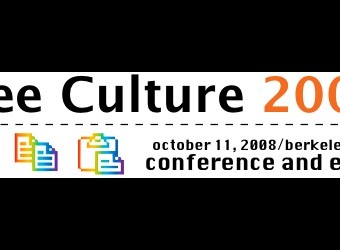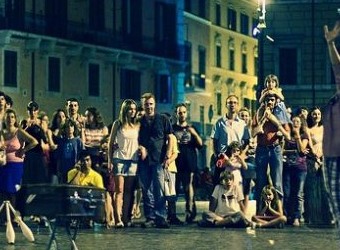Before her untimely death at 40 in January, from cancer she had been battling ferociously for a year and a half, the artist, scholar, and activist Dara Greenwald made clear that the first thing she wanted her friends to do after she died was to throw a big dance party. When the time came, Dara’s mandate, not just her permission, to dance in the void she had left behind generated a supremely joyous affair. Never have I seen so many people at a dance party actually dancing at one time. The floor might have been a giant anvil on which these hundreds of Dara’s friends and admirers hammered their grief into celebration, at least for one evening.
The loss of Dara runs deep within her vast network of friends and colleagues and even her unknown colleagues in the world who work, as Dara stated her mission, “to make resistance visible, and present.” Dara’s work and spirit came alive in video, new media, public performance, social art, and writing, much of it under the umbrella of collaborative cultural production. She had one BA and two MAs under her belt, one PhD almost completed, and a huge string of exhibitions and projects on subjects of oppression already behind her. If the Commons is “all that we share,” then Dara herself was a walking, talking commons of energy, exuberance, and originality.

She was always dancing—with her feet, yes, but more often with her head and heart. A few highlights among many: In Chicago, she co-founded Pink Bloque, a “radical feminist dance troupe dedicated to challenging the white supremacist capitalist patriarchal empire one street dance party at a time.” In Troy, New York, for the city’s twee annual Victorian Stroll, she recast herself and fellow artists and activists as United Victorian Workers, Local 518 “to advance a more accurate perception of life in Victorian times by…embodying those whose labor built the city by dressing in Victorian-era working-class apparel and performing a period-inspired strike during the event.” (A policeman asked by one of the “upper class” strollers balked, in solidarity with the “workers,” at being asked to shoo them away.) Later in Troy, and later still in Syracuse, with her longtime partner in life and work, Josh MacPhee, and Olivia Robinson, she presented the astonishing piece Spectres of Liberty, which featured projections of provocative quotations from the African American abolitionist Henry Hyland Garnet in a haunting white blow-up church erected on the site of an original long torn down.
Then there was Signs of Change, a large-scale research project and exhibit, which Dara co-curated with Josh MacPhee, about the history of social movements that culminatad in a book of the same name, still available Justseeds.org, an artist cooperative committed to making print and design work that reflects a radical social, environmental, and political stance. Both Josh and Dara were members.
I was lucky to have met Dara in 2009, when she was a resident at Blue Mountain Center, an artist colony that supports artists of all disciplines whose work evinces social concern. She returned to BMC in 2010 with Josh MacPhee and Malav Kanuga, as an organizer of a two-week session called Cultural Workers for the Commons. It was a few months after her diagnosis, and a day after a chemotherapy session. She was weak and fragile, but entirely present. She and Josh returned the following year, last summer, to visit. Thanks to a powerful new treatment, she was the picture of health, even as she told me she knew the medicine would not work forever.
The memorial gathering in downtown New York City the day after the dance party was a quieter, much sadder event. But in talking of Dara, Josh, Dara’s family, and her friends acknowledged her presence on the planet and in the room for several hours in a Quaker-inspired vigil. Many of them had been part of a “circle of care” that had coordinated the tasks of taking care of Dara when Josh was away, making them both food, taking Dara to the doctor, on walks, being there for her whenever anyone was needed. They seemed not just to have stepped up in force for a person they dearly loved, but to make palpable the spiritual bank account Dara had opened by enriching their lives.
Her father told a story about Dara when she was five, patiently punching holes in a piece of leather he had given her while he and a gathering of friends talked politics and social injustice in his studio. At a certain point her father turned to her and asked, “So Dara, what do you think about all this adult talk?” And she said, “Yes means no and no means yes.”
An early education that at least in part must have informed, Dara’s response to a friend who admitted not to liking her very much when they first met, in college. This friend thought Dara could be rude, and one time she mustered the courage to tell her so. No, Dara said, “I’m not rude. I’m direct.”
Direct to the heart. She is so missed.
— Alice Gordon
Additional Remembrances
Simply the joy of having a beam of energy come into the Blue Mountain Center the first night of a Residency, that beam being Dara, and hearing it announce “I am a Commoner.” Would that everyone would wear the identification with such joy and determination.
— Harriet Barlow
One of my favorite experiences with Dara was during the US Social Forum in Detroit a couple years back – just before Dara was diagnosed. I had a hotel room with four other friends, and it had a pool. Dara and Josh visited us one evening after the conference so we could all take a dip. So there were about 10 dirty radicals in a little indoor hotel pool, and Dara decided we should all walk in a circle together to make a little current and have the water swirl us all around the pool — like many of us did when we were little kids. Once we got it going, she couldn’t help but cracking, “See! Another whirlpool IS possible!”
— Andy Cornell
The next day we participated [after the whirlpool evening] in a big march against a toxic incinerator. It was a loud and long march with lots of colorful signs and puppets. Dara and I kept crossing paths at different points of the march, much as our lives had intersected since we first met. At one point she came up to me and the folks I was walking with at that point to tell us the word she had just come up with, sparked by seeing a man, a mutual friend and environmental justice organizer, who was playing a Very Important Role in the march: “envibro.” It was perfect, and I know it’s only a matter of time before that term catches on.
Over the year and a half that she battled cancer, I was amazed at her clarity in the face of terrifying stakes. I so appreciated her email updates, where she processed aloud with us, both sharing what she was feeling and even trying to support us in supporting her. It seemed like a small way in which she continued to live her values of transparency and community.
The last time I saw her was two days after the Interference opening. She was in and out of sleep as a result of all the medication she was taking. But she was still Dara; she kept waking up and contributing witticisms, without missing a beat. Josh and I were talking about some incident of leftist arrogance, to which Dara, who I didn’t know was awake, chimed in with the perfect descriptor: “self-righteousness from below and to the left.” And then we were all laughing because it was funny and because she had given us, yet again, a way to both see and see beyond our limitations.
— Dan Berger
No matter what, through all stages of her illness, Dara remained Dara, brilliant and creative and talented. When I visited her in the hospital she knew more about what was going on than I did— the latest gossip, happenings, and of course she always has an insightful critique (see her recent essay “Does Corporate Culture Still Suck?”). I loved seeing her present her research on feminist collectives and tactical media. The way she shared these forgotten and marginalized histories was an truly an art.
Never self conscious about challenging the status quo, at several events and screenings I have attended with her she asked during the q & a “Why aren’t women represented in this series or on this panel?”.My appreciation of her vocalizing these observations have caused me to ask myself on numerous occasions: “What would Dara think/say?”. I will always hear her voice in my mind.
— Molly Fair
I witnessed Dara’s spirit, high and wide, filling the space of The Sanctuary for Independent Media, on the evening of her passing. I seriously heard her joyous laugh echoing in the space. It was in the midst of the “North Troy Community Summit. “ I strongly felt her arms reaching out and embracing the 75 people who came, from all walks of life, as each spoke with heartfelt hope about building community. The new city administration — mayor and several city council folks— were there as allies, this is after being closed down by the city just a few years ago for being “art terrorists”! I remembered Dara, the day we were closed down, Dara, always there at the essence of the action—with camera in hand— marching in the protest line, her fun spirit transforming the tension into more of a social event/ art opening type of feel, interviewing folks with the most pertinent questions, ever vigilant to fight censorship and injustice.
But this evening of her passing, I felt Dara’s presence so profoundly, joining us on a day when we came together as a community — with focus on alternative media, transportation, nutrition, people working with slim resources but great passion from the grassroots up. I remembered that it was Dara who organized “InterAct Troy,” the first re-skilling festival at the Sanctuary, in November, 2007. She insisted we give voice to the local, especially stimulating dialogue, mapping resources, building networks, with the economically disenfranchised neighborhood here. And her vision has grown beyond anyone’s dreams!
Dara was so committed to making art and building community — and she is with us forever in her vision and passion. There is a big hole in our world of the living without her.
Yet I imagine that we will all be blessed to witness these sightings of Dara’s spirit, in visceral and powerful form, as we continue our connected journey in the days and years to come.
— Branda Miller






